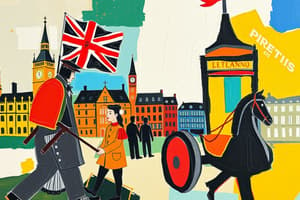Podcast
Questions and Answers
What is the primary role of the Prime Minister in the government?
What is the primary role of the Prime Minister in the government?
- To conduct criminal investigations
- To enforce laws
- To lead the government (correct)
- To ensure laws are fair
Which court is responsible for handling serious cases in the legal system?
Which court is responsible for handling serious cases in the legal system?
- High Court
- Crown Court (correct)
- Youth Court
- Magistrates’ Court
Which principle of justice focuses on equal treatment under the law?
Which principle of justice focuses on equal treatment under the law?
- Accountability
- Retribution
- Rehabilitation
- Fairness (correct)
What does the UK Human Rights Act (1998) incorporate into UK law?
What does the UK Human Rights Act (1998) incorporate into UK law?
Which organization is primarily tasked with promoting peace and human rights worldwide?
Which organization is primarily tasked with promoting peace and human rights worldwide?
What are key aspects of personal identity in the UK?
What are key aspects of personal identity in the UK?
Which of the following is NOT considered a British value?
Which of the following is NOT considered a British value?
What is a common reason for migration?
What is a common reason for migration?
What is the First Past the Post electoral system characterized by?
What is the First Past the Post electoral system characterized by?
Which of the following factors can contribute to social tension in UK society?
Which of the following factors can contribute to social tension in UK society?
Which type of democracy involves citizens voting on policies directly?
Which type of democracy involves citizens voting on policies directly?
What role do pressure groups play in UK politics?
What role do pressure groups play in UK politics?
What is one of the responsibilities of active citizenship?
What is one of the responsibilities of active citizenship?
Flashcards
British Values
British Values
Core principles of the UK, including democracy, the rule of law, individual liberty, mutual respect, and tolerance.
Direct Democracy
Direct Democracy
A system where citizens vote directly on laws and policies.
Representative Democracy
Representative Democracy
A system where citizens elect representatives to make decisions on their behalf.
General Elections
General Elections
Signup and view all the flashcards
First Past the Post (FPTP)
First Past the Post (FPTP)
Signup and view all the flashcards
Active Citizenship
Active Citizenship
Signup and view all the flashcards
Refugees
Refugees
Signup and view all the flashcards
Multiculturalism
Multiculturalism
Signup and view all the flashcards
Civil Law
Civil Law
Signup and view all the flashcards
Criminal Law
Criminal Law
Signup and view all the flashcards
Prime Minister
Prime Minister
Signup and view all the flashcards
Magistrates' Court
Magistrates' Court
Signup and view all the flashcards
Youth Justice
Youth Justice
Signup and view all the flashcards
Study Notes
Theme A: Living Together in the UK
- Identity: Personal identity shaped by age, gender, religion, culture, ethnicity, and nationality; national identity defined by shared British language, history, and values.
- Diversity in the UK: Multiculturalism viewed as a strength, fostering creativity, innovation, diverse cuisine, and traditions; however, challenges include prejudice, discrimination, and social tension.
- British Values: Key values include democracy (citizen participation), rule of law (no one above the law), individual liberty (freedom of choice), and mutual respect/tolerance.
- Community: Communities defined by shared goals, culture, traditions, or geography; Roles within communities include faith groups, schools, and charities.
- Active Citizenship: Civic engagement encompasses volunteering, campaigns (petitions, protests, lobbying), and respecting others' rights while contributing to society.
- Migration: Reasons for migration include economic (jobs), political (safety), social (family), and environmental (disasters).
- Impact of Migration: Positives include boosting the UK economy and enriching culture; challenges include pressure on public services and housing shortages.
- Refugees/Asylum Seekers: Refugees seek safety, asylum seekers apply for protection, with humanitarian responsibilities underpinned by international law.
Theme B: Democracy at Work in the UK
- Democracy: Types include direct (e.g., referendums) and representative democracy (MPs). Democracy ensures fairness, accountability, and protects rights.
- Electoral System: General elections held every 5 years, electing MPs using First Past the Post (FPTP), a system with advantages (simplicity) and disadvantages (unequal representation); local elections focus on local councils/mayors.
- Political Participation: Involves political party membership, voting, campaigning, and engaging with pressure groups like Greenpeace that seek to influence decisions; the media disseminates political information but can be biased.
- The Government: Three branches: legislature (Parliament, making laws), executive (Government, enforcing laws), and judiciary (Courts, ensuring fairness).
- Prime Minister: Leader of the government, chosen by the majority party in the House of Commons.
Theme C: Law and Justice
- Legal System: Civil law settles disputes between individuals (e.g., divorce, contracts), while criminal law deals with crimes (e.g., theft, assault); courts include magistrates' and crown courts; police enforce law and protect safety.
- Justice: Core principles include fairness (equal treatment), rehabilitation (helping offenders), and youth justice programs focusing on education and rehabilitation for under-18s.
- Human Rights: The Universal Declaration of Human Rights (1948) and the UK Human Rights Act (1998) protect fundamental freedoms and equality; discrimination (direct, indirect, harassment, victimization) is illegal under the Equality Act 2010.
- International Law/Organizations: The United Nations (UN) promotes peace and human rights globally, collaborating with NGOs (like Amnesty International) to work on international challenges like poverty and education.
Studying That Suits You
Use AI to generate personalized quizzes and flashcards to suit your learning preferences.




